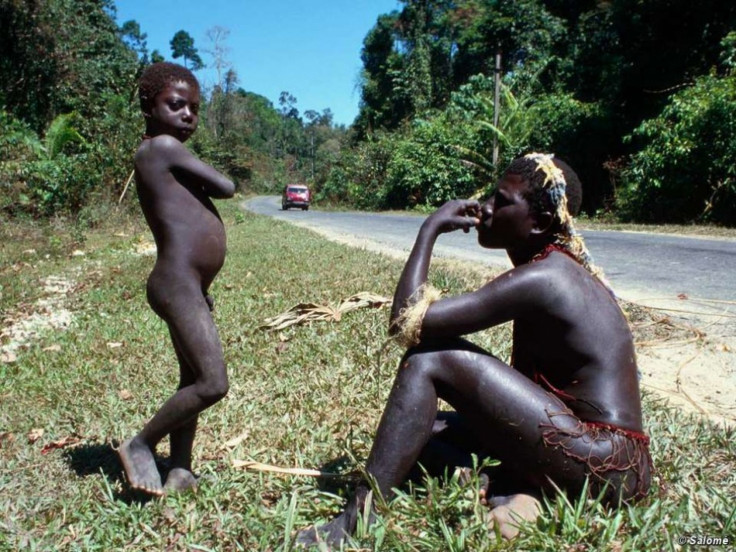Jarawa Tribe: Human Safari Scandal in Andaman Reaches British Parliament as New Video Surfaces

The human safari scandal in the Andaman Islands involving the Jarawa tribe has reached the British Parliament with MPs tabling a motion calling on India to close the illegal road that cuts through the tribe's reserve.
The motion, presented to the House of Commons by MP Andrew George, calls for an end to recently contacted Jarawa being treated like tourist attractions in so-called human safaris. It also urges the Indian government to take immediate action to close the Andaman Trunk Road, which has been operating illegally since the Supreme Court ordered it closed in 2002.
British newspaper The Observer released two additional videos over the weekend showing fresh proof of official involvement in human safaris in the Andaman Islands.
One clip shows half-naked girls being ordered to dance for a seated Indian police officer. Off camera, a voice tells the girls to move back a little more, a little more. They are then told to do it and they start dancing.
Neither clip is date-stamped, but the longer one is understood to have surfaced about two months ago in Port Blair, the capital of the Andaman and Nicobar Islands.
First exposed by tribal rights group Survival International in 2010 and brought to light by an unsettling video uploaded by The Observer last month, dozens of visitors to the remote Andaman Islands -- between India and Burma in the Bay of Bengal -- queue up daily at dawn to drive through a jungle reserve set aside for the Jarawa tribe. The tourists then toss scraps of food to the half-naked natives, commanding them to dance.
The video footage posted online is the kind of exotic encounter some tourists dream about when they set out on a so-called safari, but the practice is both devastating and humiliating for the tribe involved.
The Jarawas are taking their first tentative steps toward a relationship with the outside world, having first made contact in the late 1990s.
Some 400-strong, the Jarawas live in the thick forests of South and Middle Andaman hunting pig and monitor lizard and fishing with bows and arrows. Short, dark-skinned with curly hair, they resemble African bushmen in appearance. They are a nomadic people that live in bands of 40-50 and are thought to be amongst the first people to migrate successfully from Africa to Asia.
When Survival International first encountered the practice of human safaris back in 2010, they coerced four of the eight tourism operators to discontinue the tours down the partially closed Andaman Trunk Road.
The Jarawa people lived successfully on their island without contact with outsiders for probably about 55,000 years, until 1998, Stephen Corry, Survival's director, said at the time. Today, a road runs right through their forest home and they risk decimation by disease. They call themselves the Ang, which means 'human being,' yet they are being ogled at like animals in a game reserve.
The very last member of the neighboring Bo tribe died in January, he added. We must not allow the same fate to befall the Jarawa, or the world will lose yet another vibrant, knowledgeable and complex part of humankind.
The Andaman and Nicobar tropical island chain is home to four other rare tribes -- Onge, the Great Andamanese, the Sentinelese and the Shompens, each numbering less than 350 members.
Working with a local organization, SEARCH, Survival has distributed leaflets to tourists arriving at the islands' airport warning of the dangers of using the closed road. Yet, the practice continues as tourists bribe local police with several hundreds of dollars to view the Jarawa.
I think that a lot of people are aware of the problem now and would actively avoid it, Survival campaigner Utsa Hazarika told IBTimes. Having said that, a weekend after the first video surfaced, an Indian tourist from the mainland was arrested for trying to film a Jarawa man. I think that this practice was sort of the thing to do on the island and there will likely be people continuing to do it until the road is closed.
The Andaman Islands are part of India and the nation has laws designed to protect ancient tribal groups susceptible to outside influence and disease. Photography or coming into contact with the disease-prone Jarawas is, by law, illegal.
Outcry over the practice in the last month prompted India's Home Minister to order an investigation.
The home minister did visit and he basically didn't say anything, Hazarika said. He avoided the issue and no statements were made about whether the road should stay open or be closed. No one is taking action either way.
Local authorities have downplayed the issue. Senior Andaman policeman Shamsher Bahadur Deol said last month that over 1,000 arrests have been made in the last five years of people trying to make contact with the Jarawas, but that it's impossible for them to catch everyone.
Survival called on the public Monday to write emails through its Web site urging the Indian government to take immediate action to stop the human safaris.
This new video released by The Observer shows current precautions by the Andaman authorities are not working, Survival's Director Stephen Corry said Monday. It's time the government got to the root of the problem, which is the road. It must be closed.
© Copyright IBTimes 2024. All rights reserved.












